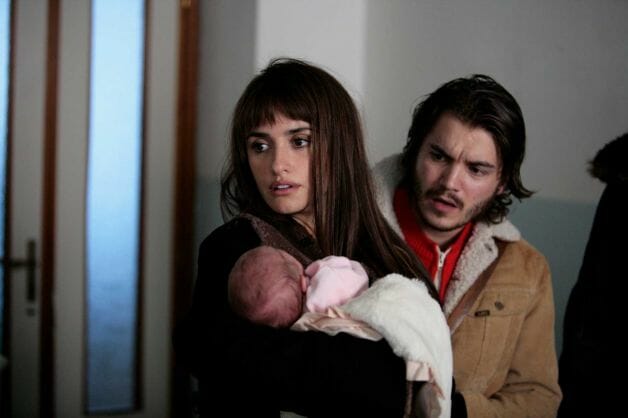
A well-meaning but lumbering drama that commingles doomed romance, ancestral mystery and wartime horror, Twice Born is the type of cinematic slog that one watches and thinks, “This would actually be much more interesting as a book.” And that makes sense, really, because that is its original medium.
Adapted by Margaret Mazzantini from her own novel of the same name, director Sergio Castellitto’s film—in English, but with liberal sprinkles of Italian and Serbian to bolster its authenticity—unfolds against the backdrop of the 1992 siege of Sarajevo, and the forward-reaching consequences of the same. While not without some nice moments from stars Penelope Cruz and Emile Hirsch, and a third-act twist that is affecting if also not entirely well set up, Twice Born suffers from poor characterizations, curious plotting and other assorted editorial missteps.
The film is parceled out largely in flashbacks from its present day of 2008, but basically tells the story of Gemma (Cruz) and Diego (Hirsch), who first meet in Sarajevo during the 1984 Winter Olympics. He’s an American photographer who sees wonderment everywhere, she’s … well, it’s never quite clear what Gemma does. But even though she’s set to be married, Diego impulsively declares his love for her on the day they meet. It’s the type of gesture that, in a comedy or even a more psychologically honest movie, would indicate temporary libidinal blindness, and show how Diego merely wants to get in Gemma’s pants. (It works.) Because Diego and Twice Born are each achingly sincere, however, it’s a marker for the characters’ star-crossed destiny.
So the two hook up, and are desperate for children. Gemma, however, seems infertile. After a miscarriage and failed run at adoption over a number of years, their mutual friend Gojko (Adnan Haskovic) sets them up with a potential surrogate mother, Aska (Saadet Aksoy), a would-be rocker with an affinity for Kurt Cobain. By this time, however, Yugoslavia is falling apart, racked by civil war and intense ethnic strife. Against this backdrop, Aska gives birth, but only Gemma and the baby escape the country. Years later Gemma, now remarried and living in Italy, returns to Sarajevo with her now-teenage son Pietro (Pietro Castellitto), trying to attain some sense of closure.
At two hours-plus, Twice Born is married to flamboyant emotionalism, a tone which seems to frequently stand apart from its running time. This means lots of scenes of people talking with their hands, as well as quasi-music video montages set to tunes like Bruce Springsteen’s “I Wanna Marry You” and Nirvana’s “Something in the Way.” Cinematographer Gianfilippo Corticelli shoots soft and expansive frames that take advantage of some of the natural beauty of the film’s locations.
But the movie also seems to travel upon artificially laid track. For every moment of posed splendor or, just as often, grimy heartache, there are two or three bits that don’t quite align (“Climb down Gemma, because you’re a nobody!” rails Pietro at one point, bizarrely), as with Gemma reacting with surprise to Gojko’s confession of also loving her, when a flashback later shows us her spurning at least one sloppy romantic entreaty.
It surely doesn’t help that the characters are so thinly sketched. Gemma remains a cipher throughout, her desperation to be a mother never much more than a crude (if occasionally effective) narrative emotional crutch. Diego, meanwhile, comes across as a bundled collection of generalized earnestness. Cruz and Hirsch have a nice rapport, and register moments of despair in recounting various tragic circumstances, but there’s no particular realism in their courtship. These are two attractive people that Twice Born simply declares to be together.
The chief problem, though, is that Castellitto and editor Patrizio Marone also don’t seem to have cracked the essential code of the book in a way that makes it engaging or palatable as a movie. Sliced and diced via its framing device, Twice Born is structured in a way that undercuts any mounting intensity of the conflict unfolding around Gemma and Diego in their younger years. When, after much meandering, the film finally pays off its Eastern bloc return journey, viewers may be moved in the moment, but not in a memorably powerful way.
Director: Sergio Castellitto
Writer: Margaret Mazzantini, based on her novel
Starring: Penelope Cruz, Emile Hirsch, Adnan Haskovic, Saadet Aksoy, Pietro Castellitto, Vinicio Marchioni, Sergio Castellitto, Luca de Filippo, Jane Birkin
Release Date: Dec. 6, 2013